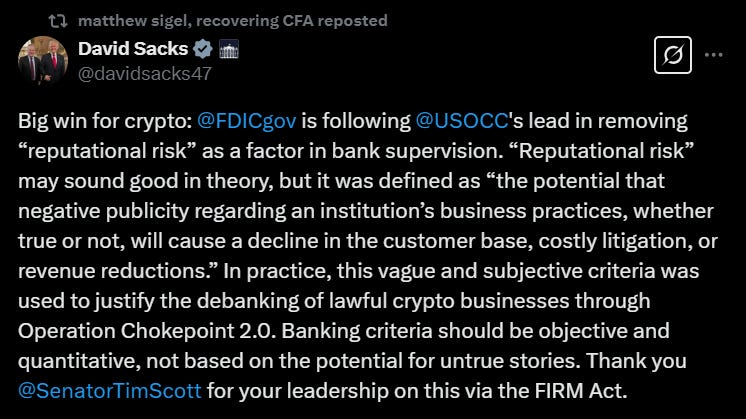FDIC Abandons 'Reputational Risk' Metric
The reversal of restrictions on Digital Assets in the US is expected to boost crypto banking prospects in the UK.
The US Federal Deposit Insurance Corporation (FDIC) is binning "reputational risk" as a supervisory metric for banks — a move that could have significant ripple effects across the Atlantic for UK crypto firms seeking banking relationships.
Acting Chairman Travis Hill announced the policy shift in a letter to Republican congressman Dan Meuser this Sunday, effectively ending what crypto advocates had dubbed "Operation Chokepoint 2.0" — the perceived systematic debanking of cryptocurrency businesses.
The policy change comes after a brutal 2023 for crypto banking, when the collapse of crypto-friendly banks like Silvergate and Signature Bank left more than 30 tech and crypto firms without banking access.
Read: When Banks Can't Bank 🖐🏾
What’s "Reputational Risk" Anyway?
The Federal Reserve defines it as "the potential that negative publicity regarding an institution's business practices, whether true or not, will cause a decline in the customer base".
Its subjective nature allowed regulators to use it as a tool to discourage banks from serving "high-risk" industries without providing clear evidence of financial misconduct. Crypto found itself lumped alongside firearms and payday lending in this regulatory grey zone.
The vague standard became the perfect weapon in what many in the industry perceived as a "witch hunt" against digital assets, until now.
Why This Matters for UK Firms
For British crypto companies with US operations, this shift represents a potential lifeline. Many UK-based digital asset firms have struggled to maintain US banking relationships despite having robust compliance programmes.
British crypto companies with US operations can finally breathe after years of rejection.
Those vague "regulatory concerns" that American banks have been hiding behind? Gone overnight. The coordinated action between the FDIC and Office of the Comptroller of the Currency (OCC) creates a clear signal that the unofficial blockade is ending.
New FDIC leadership under Hill (appointed in January) has explicitly called the previous regime "closed for business" on digital assets.
What Happens Next?
The FDIC is now developing a new digital asset policy, though details remain scarce. The rule-making process is still in development as of today.
Meanwhile, momentum builds for the Financial Institution Risk Management (FIRM) Act, which seeks to codify this change across all banking regulators. The bill advanced through the Senate Banking Committee earlier this month, though with limited Democratic support—suggesting potential political friction ahead.
With Trump's administration fully behind the crypto push, these initiatives have significant executive backing that was previously lacking.






